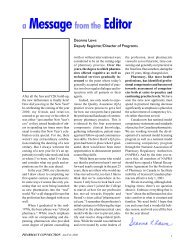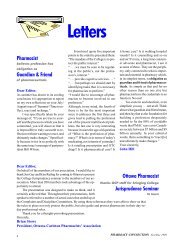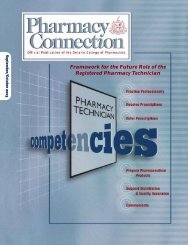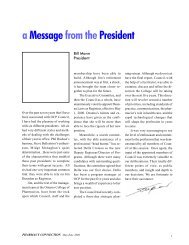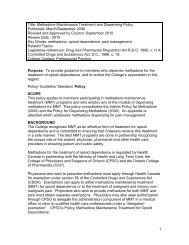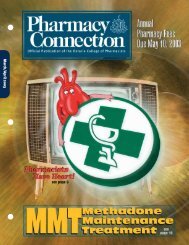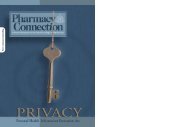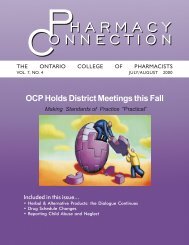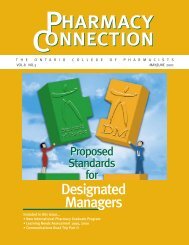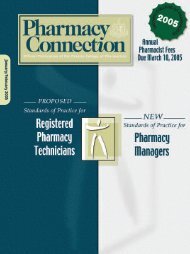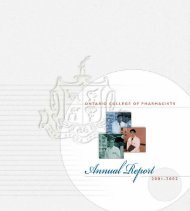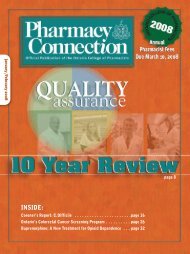July ⢠August 2003 - Ontario College of Pharmacists
July ⢠August 2003 - Ontario College of Pharmacists
July ⢠August 2003 - Ontario College of Pharmacists
Create successful ePaper yourself
Turn your PDF publications into a flip-book with our unique Google optimized e-Paper software.
COLUMN<br />
which include routine, re-inspections, new openings,<br />
acquisitions and relocations.<br />
Inspections should not be confused with investigations.<br />
Inspections fall under the jurisdiction <strong>of</strong> the Accreditation<br />
program area whereas investigations are the responsibility <strong>of</strong><br />
the Investigations and Resolutions Department. The Drug<br />
and Pharmacies Regulations Act (DPRA) provides the<br />
<strong>College</strong> with the authority to appoint inspectors and the<br />
authority to inspect pharmacies and examine records.<br />
The Inspection process for a pharmacy is similar to<br />
the Quality Assurance Program for pharmacists. It is a<br />
form <strong>of</strong> practice review. The inspections are primarily<br />
educational and conducted to assist members in<br />
complying with legislative requirements for maintaining a<br />
practice site that allows for the safe distribution <strong>of</strong> drugs<br />
and for pharmacists to maintain pr<strong>of</strong>essional and operational<br />
standards <strong>of</strong> practice. The <strong>College</strong> has also worked<br />
over the years to revise the inspection process so that it<br />
becomes a more positive experience by shifting the<br />
inspection focus from “checking the nuts and bolts” <strong>of</strong> a<br />
pharmacy to a broad review <strong>of</strong> how members practice in<br />
the pharmacy site.<br />
Unfortunately identifying deficiencies is viewed by<br />
some pharmacists as criticism or enforcement. While<br />
some pharmacists view the inspection as adversarial or<br />
negative, the underlying role <strong>of</strong> the inspector is to accurately<br />
and pr<strong>of</strong>essionally identify deficiencies in the<br />
pharmacy and/or in its members’ practice. These deficiencies<br />
are brought to the attention <strong>of</strong> the designated<br />
manager and/or the owner.<br />
The inspectors are also available to answer questions<br />
about pharmacy practice, clarify issues and to make recommendations.<br />
The <strong>College</strong> and its inspectors work to provide<br />
the most suitable and constructive way to achieve the ultimate<br />
goal <strong>of</strong> inspection, namely, to ensure that every<br />
pharmacy complies with the legislation and standards and<br />
that pharmacists meet the Standards <strong>of</strong> Practice.<br />
Routine Inspections<br />
Every accredited pharmacy receives, at no cost, one inspection<br />
and one follow-up re-inspection (if required).<br />
Cost Recovery<br />
In the past, pharmacies that did not achieve compliance<br />
were re-inspected until compliance was achieved or until<br />
the pharmacy was referred to the Accreditation Committee<br />
for review and a possible further referral to the Discipline<br />
Committee for resolution. This process led to many delays<br />
from initial visit to a final resolution, and in some cases, it<br />
resulted in four or five pharmacy visits over a period <strong>of</strong> years.<br />
It was also found that, in most cases, the same pharmacies<br />
were responsible for several re-inspections and a more expeditious<br />
process was needed.<br />
In 2002, the Accreditation Committee believed that it<br />
was unfair for the majority <strong>of</strong> compliant pharmacies to pay<br />
for the few non-compliant locations and recommended that<br />
cost recovery charges be imposed on non-compliant locations.<br />
Effective January <strong>2003</strong>, pharmacies that the<br />
Committee decides require an inspection beyond their original<br />
inspection and one re-inspection will now be required to<br />
pay $500 (plus GST) for all future visits. Costs can also be<br />
charged for inspections determined through an undertaking<br />
as a result <strong>of</strong> a Complaints hearing or can be ordered as part<br />
<strong>of</strong> a Discipline decision.<br />
Pharmacy Connection <strong>July</strong> • <strong>August</strong> <strong>2003</strong> 25



